The Crucial BX200 (480GB & 960GB) SSD Review: Crucial's First TLC NAND SSD
by Billy Tallis on November 3, 2015 9:00 AM ESTMixed Random Read/Write Performance
Most real-world use consists of a mix of reads and writes, and interleaving the two often poses a particular challenge to drive controllers. This mixed random access test is conducted across a 16GB span of the drive, with a queue depth of 3.
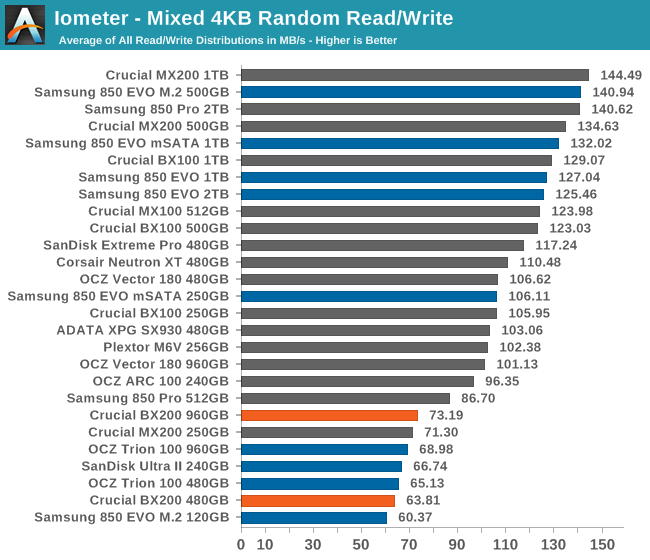
The BX200's reasonable read speeds are apparently able to compensate for the write performance enough to keep at least the 960GB BX200 out of last place for the mixed random test, but the 480GB only manages to surpass a 120GB drive.
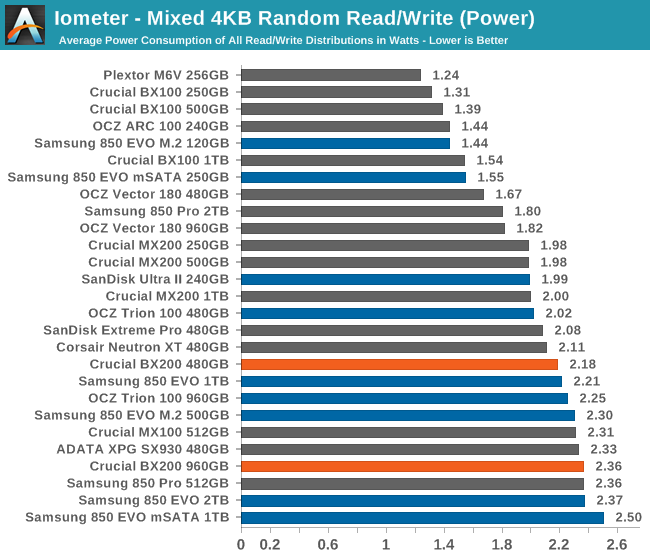
The power draw is even more mainstream than the performance, because despite being inefficient the BX200 isn't unreasonably power hungry in an absolute sense.
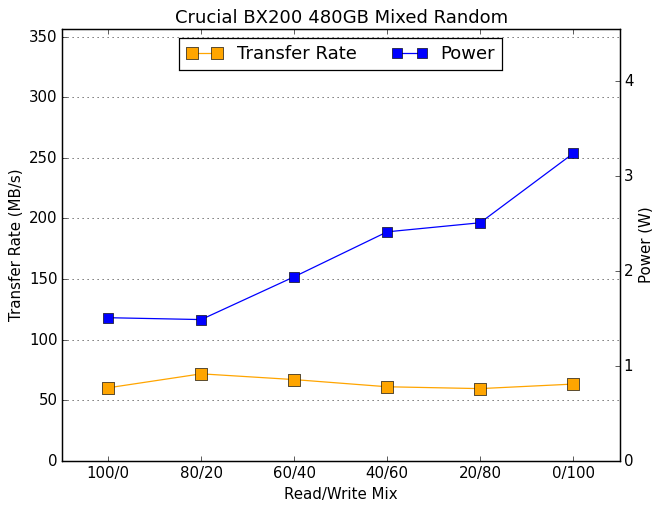 |
|||||||||
| Default | |||||||||
Slow and steady doesn't win the race here. Most drives gain speed near the end of the test for the write-heavy portions, but the BX200 gains no performance as the power consumption climbs. It doesn't have the slight bathtub curve shape in the middle the way the Trion 100 does, which is how it keeps pace even without the boost at the end.
Mixed Sequential Read/Write Performance
At either end of this test, when the workload is heavily skewed toward either reads or writes, most drives perform well. In between, performance typically suffers greatly, and that's where the winners and losers of this test are usually determined. Anything that's duplicating or transforming a large amount of data on the drive will produce I/O patterns similar to this test. Creating a System Restore snapshot, backing up files to a different location on the same drive, and file compression can all produce interleaved reads and writes of large blocks of data, though not necessarily fast enough to be limited by the drive's performance. Heavy multitasking can add up to a mixed workload.
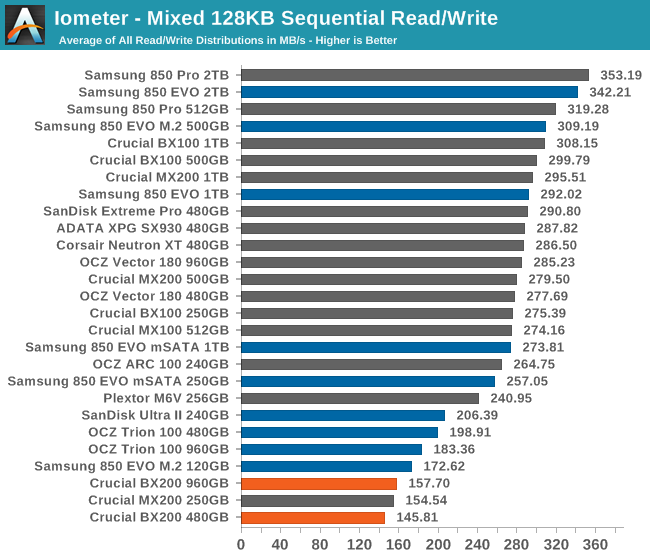
With average read speeds and poor write speeds, the BX200 is in last place for the overall average, since the competition didn't have any acute weaknesses.
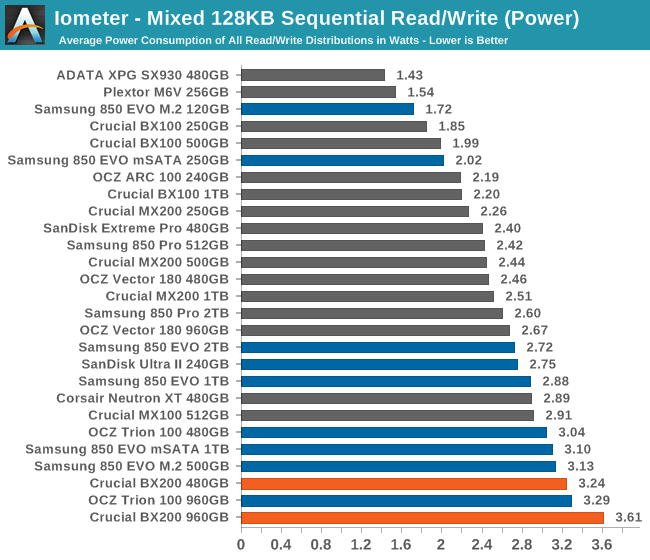
Average power consumption is once again high, and the 960GB is a particular outlier.
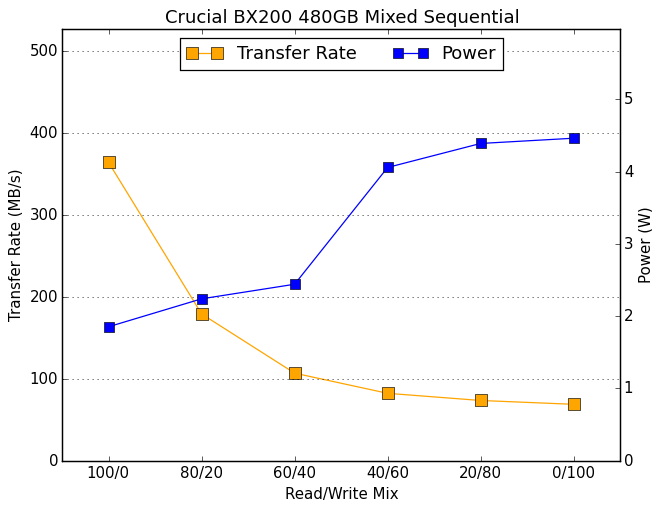 |
|||||||||
| Default | |||||||||
The graph of performance as more writes come into the mix shows just how quickly things get bad. There's a big jump in power consumption once writes are more common than reads, and the drive is almost as overwhelmed at 40/60 as it is for the pure writes.










85 Comments
View All Comments
paulgj - Tuesday, January 26, 2016 - link
I see the MU02 firmware for this drive is out, are there any plans to retest?LarsBars - Tuesday, February 2, 2016 - link
The BX200's are getting cheap now, and they have a new firmware update, MU02. Any chance that you could re-run the BX200's through the tests and see if anything is improved? Thanks!Amoro - Monday, April 11, 2016 - link
I don't see the point since it only states stability/reliability improvements and doesn't mention anything about performance.Release Date: 1/12/2016
Corrected SMART attribute threshold values
Improved general reliability and stability
Minor Bug Fixes and general reliability and stability Improvements
freddell - Saturday, July 2, 2016 - link
I dont know how your IO tests throughput numbers are so high compared to MX100 or MX200. As soon as I tried to clone a 1TB drive for my wifes laptop the write speed dropped to 60 MB/s or less, clearly slower than the HDD it was meant to replace. BX is a truly horrible drive for write performance, I will not recommend to anyone. I dont know why it was not highlighted in your review.dh33r4j - Thursday, August 25, 2016 - link
I got the 480GB for £73 ($95) during lightning sale from Amazon. When the price is right, I think it becomes worth it. For someone moving from a HDD to SSD, I coudn't say no to the offer.